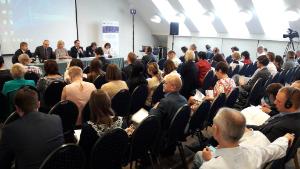Regional development
Decentralisation in Ukraine: Seminar 3
3RD OECD SEMINAR: ENHANCING PUBLIC INVESTMENT ACROSS LEVELS OF GOVERNMENT
|
This third seminar in a series being held as part of the OECD project Supporting Decentralisation in Ukraine, was held in Lviv on 22 June 2017. It explored how the OECD’s Recommendation of the Council on Effective Public Investment across Levels of Government (Ukrainian) can help Ukraine strengthen subnational finance and investment practices in the context of the country’s ongoing decentralisation reform. The audience included representatives of national and subnational administrations from throughout Ukraine, policy practitioners, think tanks, associations and members of the international donor community involved in Ukraine’s decentralisation reform. The seminar was opened by Ms. Olena Kucherenko, Director of the Department for Regional Development of the Ministry of Regional Development, and Mr. Rostislav Zemlynsky, First Deputy Head of Lviv Regional State Administration. Participants had the opportunity to share their experience with: |
 |
|
In addition, a broad range of practical case studies and good policy practices from OECD member countries were presented. |
||
key messages
This seminar highlighted some of the benefits Ukraine's newly amalgamated communities are experiencing through decentralisation reform, including greater autonomy in decision making. The changes introduced will have a positive impact on the quality of life and well-being of citizens in the short, medium and long terms. It also underscored a number of remaining challenges particularly with respect to sub-national finance and investment, including:
- Framework conditions are fundamental for subnational governments when investing in a decentralised context. Such conditions include: adequate responsibilities and political power, stable and sufficient financial resources, local management capacity, and shared responsibility for planning, co-ordination, policy making and developing safety standards.
- A stable legislative environment is essential to reduce uncertainty, provide clarity on the availability of funding, and allow mayors to conduct long-term strategic planning for the development of their communities.
- There is no optimal rate of decentralisation, but Ukraine should ensure balance in the way various policy functions are decentralised (e.g. health, education, transport, etc.)
- A place-based approach to sub-national public investment should be supported through investment strategies differentiated based on size, location, economic structure, and distance to the productivity frontier.
- In order to strengthen the potential for subnational investment in Ukraine, appropriate and effective co-ordination mechanisms need to be developed across levels of government, together with strong investment in building subnational capacities.
- The current legal framework for land management does not allow newly amalgamated communities to administer and own state-owned lands outside the boundaries of their populated areas. This limits the ability of local government to generate own-source revenue and to attract investment that can help develop their territory.
- Subnational governments should diversify sources of funding and strengthen subnational capacity in order to bridge the infrastructure financing gap.
- Ukraine should consider a balanced approach between complete centralisation and decentralisation of transport systems, and there is a need to undertake in-depth analysis to understand the best way of reaching a satisfactory equilibrium in the system.
DOCUMENTATION
| AGENDA
|
PROCEEDINGS
|
||
| English | Ukrainian | English |
Ukrainian |
presentations
The following presentations highlighted the impact of decentralisation on economic and social development, ranging from finance and budgeting to transport, infrastructure and service delivery. Presentations focused on good practices from OECD countries, and the current situation and challenges faced in Ukraine and in Lviv at the oblast and local level.
- Decentralisation: Why and How?, Mr. Hansjörg Blöchliger, OECD (English/Ukrainian)
- OECD Experience with Strengthening Fiscal Capacities for Subnational Public Investment, Ms. Isabelle Chatry, OECD (English/Ukrainian)
- Strengthening Fiscal Capacities for Subnational Public Investment: The Case of Poland, Dr. Dawid Szesciło, University of Warsaw, Poland (English/Ukrainian)
- Co-ordinating Public Investment across Levels of Government, Ms. Dorothée Allain-Dupré, OECD (English/Ukrainian)
- Local Authorities and Public Service Delivery in Flanders, Mr. Christof Delatter, Flemish Association of Cities and Municipalities, Belgium (English/Ukrainian)
- Transport Policy and Subnational Investment in a Decentralised Context: OECD Trends and Tools, Ms. Maria-Varinia Michalun (English/Ukrainian)
- Decentralisation of Governance in Transport Systems, Ms. Rosário Macário, University of Lisbon, Portugal (English/Ukrainian)
PRESENATIONS BY UKRAINIAN SPEAKERS
- Performance of Local Budgets for 2016 and January-May 2017 under conditions of Implementation of the Reform of Inter-Budgetary Relations, Ms. Yulia Ostrishchenko, Ministry of Finance of Ukraine (Ukrainian)
- Strengthening the Financial Capacity of Communities: Own Resources and Public Financial Support for Local and Regional Development, Ms. Yanina Kazyuk, Ukrainian Association of District and Region Councils (Ukrainian)
- Lviv City: Investment Activity, Ms. Olga Syvak, Lviv City Council (English)
- Investments in the Infrastructure Development of Novokalyniv Amalgamated Hromada, Mr. Bohdan Yuzviak, Head of Novokalyniv Amalgamated Hromada, Lviv Oblast (Ukrainian)
- Effectiveness of Current Government Investment Instruments: a Community View, Mr. Ihor Abramiuk, Association of Newly Amalgamated Communities (Ukrainian)
Related Documents
